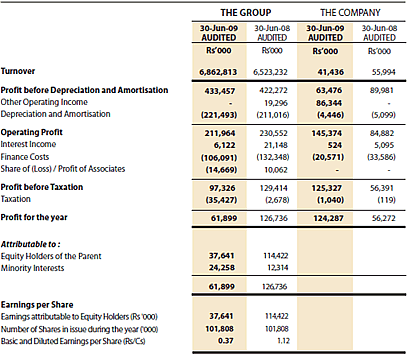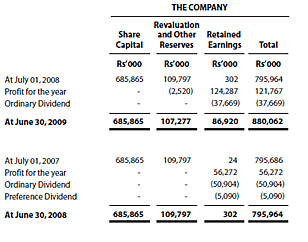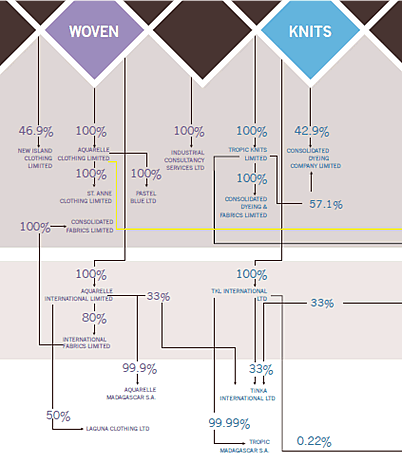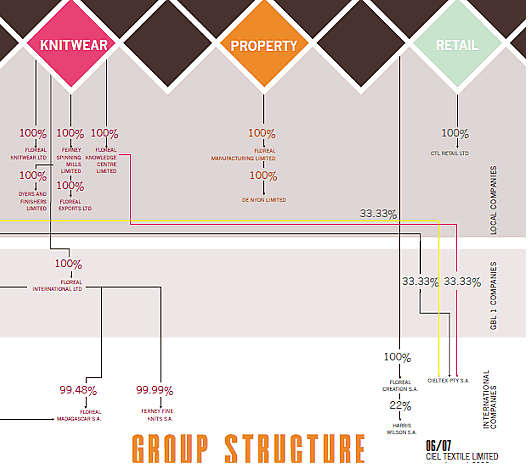 Ciel Textile
Ciel Textile
All data are collected in the Fiscal Year of 2008-2009.
Company Profile and History
CIEL Textile has developed into a regional one stop shop in textile, with completely vertically integrated business units and production of 25 million garments annually. CIEL Textile is the second largest woolmark knitwear supplier in the world. CIEL Textile has operational units in Mauritius, Madagascar and India. The group has 8 business units: knitwear, knits, shirts, bottoms, spinning, weaving, dyeing and retail. Through its retail unit, CIEL Textile commercialises the brand Harris Wilson and Floreal Boutiques.
Floreal Knitwear Ltd is the leading knitwear manufacturer in the African Sub-Saharan Region and is the second largest woolmark knitwear supplier in the world. Floreal produces men's, ladies, and kids wear styles over various knitting gauges. Floreal has its own vertically integrated woollen spinning mill (Ferney Spinning Mills), which supplies 70% of its yarn needs. Fine quality yarns are imported from Europe, the Far East and Africa. Knitting, dyeing, finishing, printing and embroidery activities are all carried out in-house. Floreal Knitwear has also invested in a world class wet processing plant where it processes both cotton and wool garment dyeing.
Aquarelle Clothing Shirts Division is an international shirts manufacturer operating in a homogenous upper/middle market segment.
The company is organic and Fair trade accredited for factories in Mauritius.
In Country Location
Ferney Spinning Mills Ltd; Royal Road, Forest Side, Mauritius; Tel: (+ 230) 601 3000; Fax: (+ 230) 675 6100
Services and Products
Textile and apparel manufacturing
CIEL Textile
| Units 000s | Location | Product type | ||
|---|---|---|---|---|
| Garments | Floreal Knitwear | 5,000 | Mauritius, Madagascar, China, Bangladesh | Sweaters |
| Aquarelle Clothing | 6,000 | Mauritius, Madagascar and India | Woven Shirts | |
| New Island Clothing (50%) | 1,200 | Mauritius | Woven Shirts | |
| Tropic Knits | 16,000 | Mauritius, Madagascar | Leisurewear | |
| Fabrics Yarns | Consolidated Fabrics | 8,000 (M) | Mauritius | Woven Fabrics |
| Ferney Spinning Mills | 1,800 (tons) | Mauritius | Carded Yarn Spinning | |
| Consolidated Dyeing & Fabrics Limited | 5,000 (tons) | Mauritius | Knitted Fabrics | |
| Dyers and Finishers | 1,400 (tons) | Mauritius | ||
| CIEL Textile | 28,200 |
Number of Employees
17,363 employees
Financial Information


Market Share
The company is the second largest Woolmark knitwear supplier in the world with 20 percent of annual production coming from Mauritius.
Business Objective
“To become the leading woolmark knitwear company in the world”
Business Model
“The guidelines of our strategy are: consolidate our operations regionally, get better and move higher upmarket gradually. A temporary downsize in the knits cluster is part of the strategy; now that we have well established profitable international operations (i.e. Aquarelle Clothing in India and Floreal Knitwear sourcing from Bangladesh and China) we need to step up the growth. Both Floreal Knitwear and Aquarelle Clothing are looking for potential investments in Bangladesh in the coming 18 to 24 months; and despite the negative external factors affecting our turnover & profitability, keep investing in our customer relationships, key staff and know-how so that we keep improving our levels of customer satisfaction and operational effectiveness.
As a result of the above, although the short-term profitability is under enormous pressure, we hope to build real value which should unlock itself once the external factors turn from negative to positive.
For Floreal Knitwear Ltd (FKL), the lean manufacturing concept we introduced last year is starting to pay off and we managed to contain cost of production in Mauritius (even in a high inflation year). Costs in Madagascar have increased due to its currency appreciation coupled with a rise in salaries as well as increases in energy and logistics costs.
More emphasis will be placed on cost management for both Mauritius and Madagascar. We have targeted a 15% gain in efficiency through lean techniques (most of it to be achieved in Madagascar). On the marketing front, our strategy will be to consolidate our customer base by offering better value added products. We are investing in automatic knitting machines in Mauritius to complete our total product offer.
We have established joint research programs with strategic customers in order to have direct communication line on design, trends and fashion. We present two in-house collections yearly with continuous updating / re-actualisation throughout the season. We also offer designer to designer service partnered with strategic customers.”
Ownership of Business


Benefits Offered and Relations with Government
The manufacturing sector has been dominated by textiles and clothing. In response to the changing international environment (increasing competition resulting from the multilateral liberalization of textiles and clothing) and in order to boost competitiveness, most incentives granted to the sector were abolished by the Finance Act 2006. However, three components of the package remain effective for mills that start operations before 30 June 2008: a corporate tax holiday until 30 June 2016, special investment tax credit, and a tax credit to investors. Similar incentives apply to weaving, dyeing, and knitting companies. Other incentives to these industries include land at concessionary rates; duty-free and VAT-free raw materials and equipment; no tax on dividends or capital gains; 50% relief on personal income tax for two expatriate staff; and concessionary electricity tariffs.
The development of textile and clothing, the main industry, was favoured in the past by preferences under the Multifibre Arrangement (MFA), and preferential access to key markets such as the EC and the United States. Other factors that have contributed to the growth of the industry include relatively low labour costs, incentive schemes, a well-developed banking subsector, good infrastructure, and long-standing business relations with buyers.
In order to increase investment and enhance the performance of companies with growth potential, the Government set up a ten-year National Equity Fund, following the adoption of the 2002 03 National Budget. One of its objectives is to participate in the equity capital of new ventures in cotton spinning, and existing enterprises in the textile and clothing sector that have credible business plans for expansion or restructuring. Equity participation normally ranges from MUR 10
Nominal average tariff protection has been lowered from 20.6% in 2001 to the current 6.8 percent.
Product Development
Nothing of importance to report




